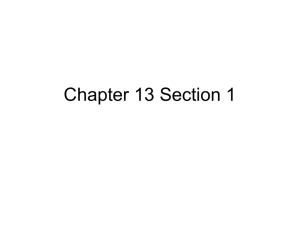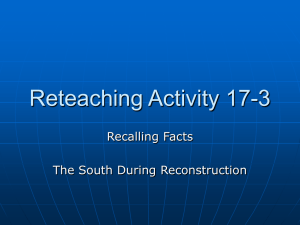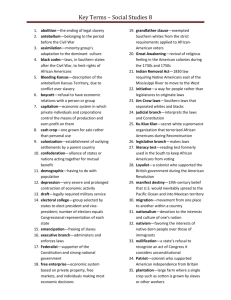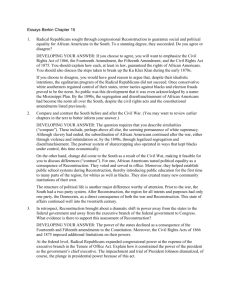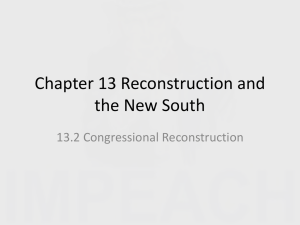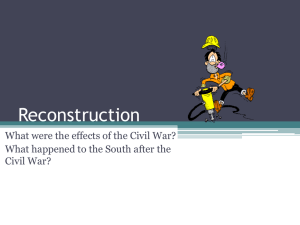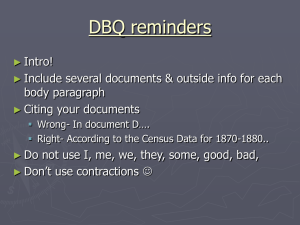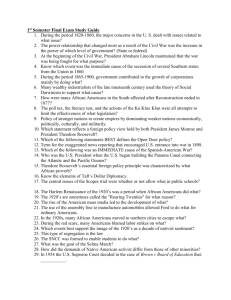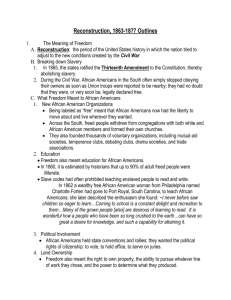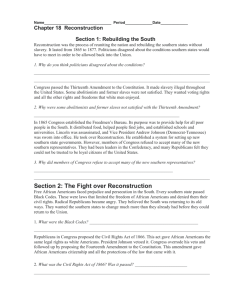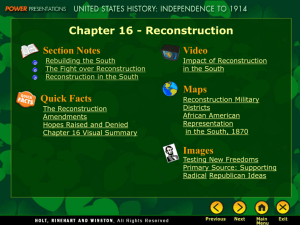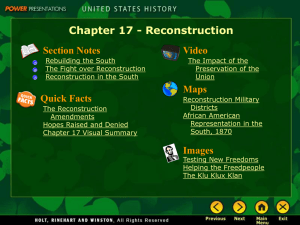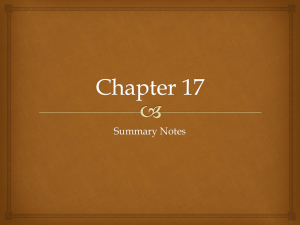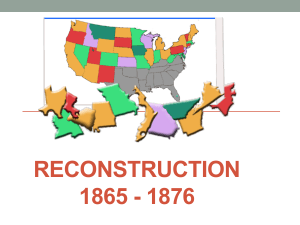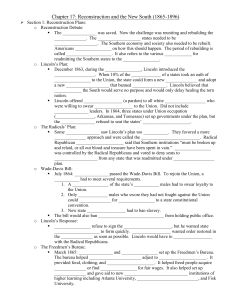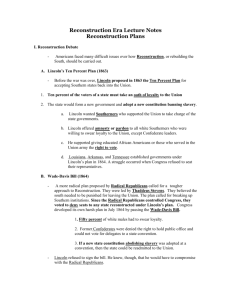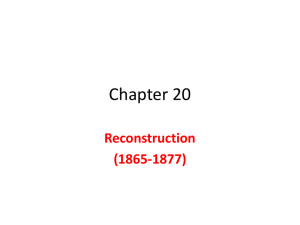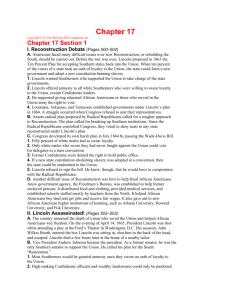Chapter 20: Reconstruction (1865-1877)
advertisement
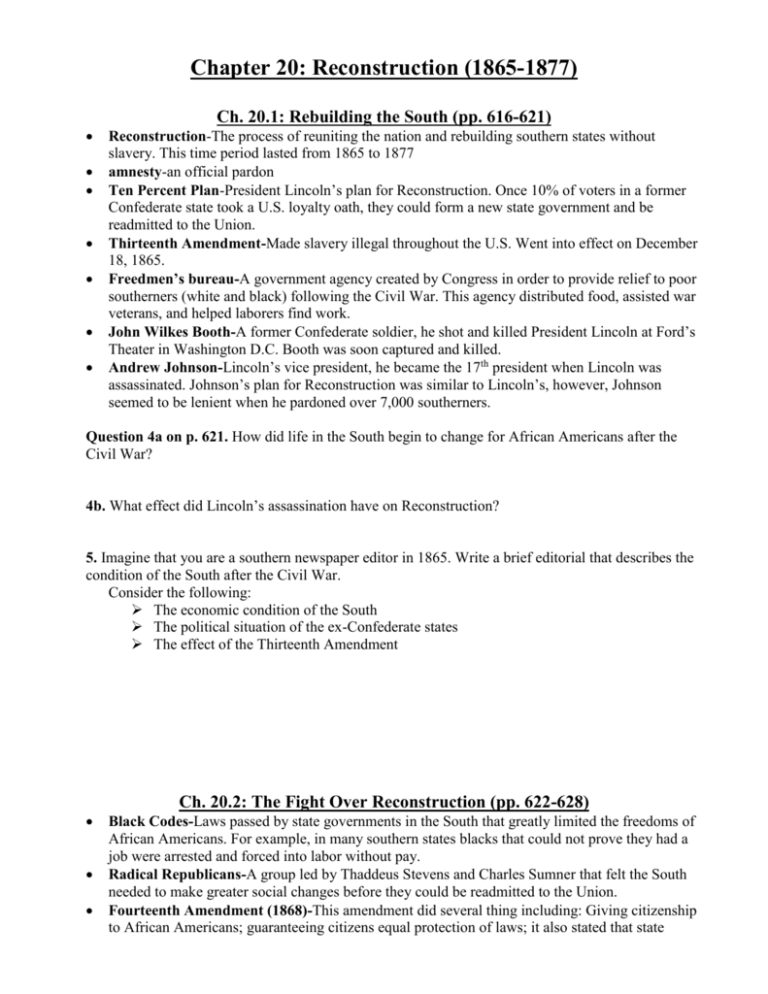
Chapter 20: Reconstruction (1865-1877) Ch. 20.1: Rebuilding the South (pp. 616-621) Reconstruction-The process of reuniting the nation and rebuilding southern states without slavery. This time period lasted from 1865 to 1877 amnesty-an official pardon Ten Percent Plan-President Lincoln’s plan for Reconstruction. Once 10% of voters in a former Confederate state took a U.S. loyalty oath, they could form a new state government and be readmitted to the Union. Thirteenth Amendment-Made slavery illegal throughout the U.S. Went into effect on December 18, 1865. Freedmen’s bureau-A government agency created by Congress in order to provide relief to poor southerners (white and black) following the Civil War. This agency distributed food, assisted war veterans, and helped laborers find work. John Wilkes Booth-A former Confederate soldier, he shot and killed President Lincoln at Ford’s Theater in Washington D.C. Booth was soon captured and killed. Andrew Johnson-Lincoln’s vice president, he became the 17th president when Lincoln was assassinated. Johnson’s plan for Reconstruction was similar to Lincoln’s, however, Johnson seemed to be lenient when he pardoned over 7,000 southerners. Question 4a on p. 621. How did life in the South begin to change for African Americans after the Civil War? 4b. What effect did Lincoln’s assassination have on Reconstruction? 5. Imagine that you are a southern newspaper editor in 1865. Write a brief editorial that describes the condition of the South after the Civil War. Consider the following: The economic condition of the South The political situation of the ex-Confederate states The effect of the Thirteenth Amendment Ch. 20.2: The Fight Over Reconstruction (pp. 622-628) Black Codes-Laws passed by state governments in the South that greatly limited the freedoms of African Americans. For example, in many southern states blacks that could not prove they had a job were arrested and forced into labor without pay. Radical Republicans-A group led by Thaddeus Stevens and Charles Sumner that felt the South needed to make greater social changes before they could be readmitted to the Union. Fourteenth Amendment (1868)-This amendment did several thing including: Giving citizenship to African Americans; guaranteeing citizens equal protection of laws; it also stated that state governments could not deprive any persons from life, liberty, or property without due process of the law. Civil Rights Act (1866)-Laws that divided the South into 5 military districts, with a U.S. military commander in charge of each district. The military would remain in the South until each state rejoined the Union. Ulysses S. Grant-He was a famous Union general and war hero. He was elected the 18th President of the U.S. in 1868 as Republican. He won narrowly thanks to the votes of African Americans. Impeachment-The process used by a legislative body (Congress) to bring charges of wrongdoing against a public official, such as President Andrew Johnson in 1867. Fifteenth Amendment-This amendment granted suffrage or the right to vote to all African American men in the U.S. Key Questions: 1. How did Black Codes restrict African Americans’ freedoms? 2. Why did Radical Republicans try to impeach President Johnson? 3. How did Republicans try to protect the civil rights of African Americans? Ch. 20.3: Reconstruction in the South pp. 629-634 Carpetbaggers-The name given to northerners, especially Republicans, who moved to the South during the Reconstruction era. Scalawags-Name given to southerners, especially Republicans, who supported Reconstruction for private gains. Roughly defined as mean fellows. Hiram Revels-He became the first African American in Congress in 1870. He took over the seat previously held by Jefferson Davis in Mississippi. Ku Klux Klan-A secret society created by white southerners in 1866 that used terror and violence to keep African Americans from obtaining civil rights. Compromise of 1877-An agreement that settled the disputed presidential election of 1876. Democrats agreed to accept Republican Rutherford B. Hayes as President. In return, all federal troops would leave the South. This Compromise marked the end of the Reconstruction era. Poll tax-A special tax that a person had to pay in order to vote. It was used to stop African Americans from voting. Segregation-The forced separation of blacks and whites. Jim Crow laws-Laws that enforced segregation in southern states. Plessy v. Ferguson (1896)-U.S. supreme court case that established the separate-but-equal doctrine for public facilities. Ch. 20.4: The New South pp. 635-639 Sharecropping-A system used on Southern farms after the Civil War in which farmers worked land owned by someone else in return for a small portion of the crops. Spirituals-Emotional Christian songs sung by African Americans, mixing African and European elements. “Swing Low, Sweet Chariot” is an example of a spiritual.


